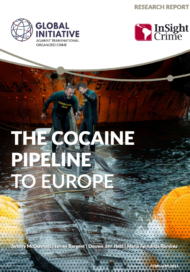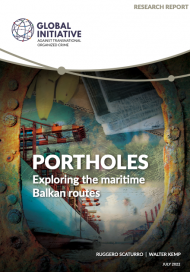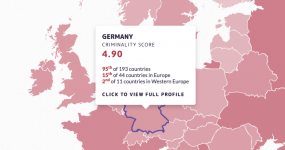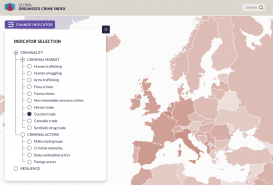In the early hours of 25 April 2024, employees of a well-known supermarket chain in southern Berlin made a startling discovery: while unpacking a delivery of bananas, they came across several packages containing white powder.
They were not the only ones. Over the course of the day, similar loads were found in six other supermarkets owned by the same company in Berlin and four supermarkets in the surrounding state of Brandenburg. That afternoon, the authorities announced that the white powder was in fact cocaine, and that 200 kilograms of the substance had been seized in the seven Berlin supermarkets alone.
The use of banana freight to smuggle cocaine into Europe is fairly common – after all, bananas and cocaine share common points of origin. In 2023, Germany imported around 1.3 million tonnes of bananas, mainly from Colombia, Ecuador and Costa Rica, some of the world’s top producers or transit countries of cocaine. Drug traffickers have long realized that hiding cocaine in these shipments is a good way to evade port authorities. Organized crime groups typically use the rip-on/rip-off system, in which cocaine is removed from containers upon arrival at major ports and the containers resealed with counterfeit customs seals to disguise the tampering.
Cocaine seizures at ports in Germany and across Europe have increased dramatically in recent years (seizures in the port of Hamburg, for example, have tripled since 2019). But there is little doubt that such seizures only scratch the surface of the problem. The law enforcement operation against messaging service EncroChat also brought to light the scale and sophistication of the cocaine business in Hamburg, which has become one of Europe’s major drug trans-shipment hubs. While levels of violence and corruption have not reached those of Rotterdam and Antwerp, there are signs that Hamburg is catching up. The port has seen increasingly aggressive organized crime behaviour, such as a series of incursions in 2023 (allegedly to take cocaine shipments out of the port), as well as growing violence between competing criminal networks.
Domestically, there are clear indications that the cocaine market has boomed in recent years. The amount of cocaine seized in Germany has increased sevenfold, from 5 tonnes in 2018 to 35 tonnes in 2023. While some of the product may be lost, as in the Brandenburg supermarkets, these amounts may be trivial to the networks involved, a business expense to be written off along with the cost of seizures. And with ongoing oversupply of cocaine in source countries – production has allegedly more than doubled since 2014 – the cocaine pipeline to Germany seems set to become even busier.
For many Germans, the extent of organized crime activity in their country may come as a surprise. ‘There was a perception that Germany, as other European countries, was immune to organized crime,’ said Mark Shaw, director of the Global Initiative Against Transnational Organized Crime (GI-TOC), at a conference hosted by the Friedrich-Ebert Foundation in Berlin on 14 May 2024. However, as Shaw noted, the findings of the Global Organized Crime Index suggest the opposite. Between 2021 and 2023, Germany’s criminality levels increased while the country’s resilience to organized crime declined. Drug trafficking, human trafficking and financial crime were the illicit markets identified as having grown the most between 2021 and 2023.
Organized crime has been on the radar of policymakers for decades. The shooting of six ‘Ndrangheta members in Duisburg in 2007 was a key moment in the debate on organized crime in Germany, and several high-profile art thefts by so-called clan-based criminal groups – notably, the burglaries of the Dresden Green Vault in 2019 and the Bode Museum in 2017 – triggered massive public outrage and put organized crime higher on the political agenda.
In addition, the last two years have seen a flurry of activity. In 2022, the federal government adopted a full-fledged strategy to counter serious and organized crime, and the 2023 National Security Strategy identified organized crime as a substantial threat. A new government agency – the Federal Office to Combat Financial Crime – is being established. Germany has also joined the coalition of European countries against organized crime and convened the Hamburg Summit on 7 May 2024, which adopted an ambitious declaration. The participating countries – Belgium, France, Germany, Italy, the Netherlands and Spain – committed themselves to enhancing the resilience of their countries’ logistical hubs to organized crime, to intensifying efforts to disrupt the upstream flow of cocaine in countries of origin and transit, and to focusing on dismantling criminal networks.
Additional measures are being taken to address the cocaine pipeline itself. In February and March 2024, the minister of the interior and community, Nancy Faeser, visited Brazil, Peru, Ecuador and Colombia to improve cooperation with the main source and transit countries for cocaine. And in Hamburg, the police have launched a campaign to prevent port workers from becoming involved with organized crime groups, as well as an anonymous whistle-blower portal to report so-called ‘inbound offenders’ (Innentäter) – port employees who collaborate with criminal networks.
But more is needed to build the country’s resilience to organized crime. As other contexts have shown, state efforts work best when they are undertaken in partnership with civil society to create a holistic response. Speaking at the Friedrich-Ebert Foundation conference, Faeser therefore underlined the need for a network-based approach to countering transnational organized crime, one that recognizes the value of consulting law enforcement, governance and development practitioners in the search for innovative mitigation strategies.
There is also a growing recognition that to gain a better understanding of the problem, it is necessary to look beyond national borders and assess the entire criminal ecosystem. Indeed, Germany is not alone in facing the threat of organized crime, not even within Europe. In recognition of this, the GI-TOC has created a new observatory focused on Europe, based in Berlin. The European observatory will support civil society awareness-raising and improve research and analysis of the rapidly evolving organized crime landscape in Germany and beyond.
Subscribe to the GI-TOC Observatory of Organized Crime in Europe mailing list to stay updated on our upcoming publications and initiatives.
Deutschland verstärkt seine Bemühungen gegen organisierte Kriminalität
In den frühen Morgenstunden des 25. April 2024 machten die Mitarbeiter*innen einer bekannten Supermarktkette im Süden Berlins eine verblüffende Entdeckung: Beim Auspacken einer Bananenlieferung stießen sie auf mehrere Pakete mit weißem Pulver.
Diese Pakete waren nicht die einzigen. Im Laufe des Tages wurden ähnliche Ladungen in sechs weiteren Supermärkten desselben Unternehmens in Berlin und vier Supermärkten im umliegenden Land Brandenburg gefunden. Am Nachmittag gaben die Behörden bekannt, dass es sich bei dem weißen Pulver tatsächlich um Kokain handelte und dass allein in den sieben Berliner Supermärkten 200 Kilogramm der Substanz sichergestellt worden waren.
Die Verwendung von Bananenfracht zum Schmuggeln von Kokain nach Europa ist relativ häufig – schließlich haben Bananen und Kokain häufig dieselben Herkunftsorte. Im Jahr 2023 importierte Deutschland rund 1,3 Millionen Tonnen Bananen, vor allem aus Kolumbien, Ecuador und Costa Rica, die zu den weltweit wichtigsten Erzeuger- oder Transitländern von Kokain gehören. Drogenhändler haben längst erkannt, dass das Verstecken von Kokain in diesen Sendungen eine gute Möglichkeit ist, den Hafenbehörden zu entgehen. Kriminelle Netzwerke nutzen in der Regel die Rip-on/Rip-off-Methode, bei dem Kokain bei der Ankunft in großen Häfen aus den Containern entfernt und die Container mit gefälschten Zollsiegeln wieder verschlossen werden, um die Manipulation zu verschleiern.
Die Kokainsicherstellungen in deutschen und europäischen Häfen haben in den letzten Jahren drastisch zugenommen (die Sicherstellungen im Hamburger Hafen beispielsweise haben sich seit 2019 verdreifacht). Es besteht jedoch kaum Zweifel daran, dass solche Sicherstellungen nur die Spitze des Eisbergs darstellen. Die Strafverfolgungsmaßnahmen gegen den Messenger-Dienst EncroChat hat auch das Ausmaß und die Raffinesse des Kokaingeschäfts in Hamburg deutlich gemacht, das sich zu einem der wichtigsten Umschlagplätze für Drogen in Europa entwickelt hat. Auch wenn das Ausmaß an Gewalt und Korruption noch nicht das Niveau von Rotterdam und Antwerpen erreicht hat, Hamburg scheint hier aufzuholen. Im Hafen ist eine zunehmend aggressive Präsenz der organisierten Kriminalität zu beobachten. Dies zeigt z. B. eine Reihe von Einbrüchen in den Hafen im Jahr 2023 (angeblich, um Kokainlieferungen aus dem Hafen zu bringen) sowie zunehmende Gewalt zwischen konkurrierenden kriminellen Netzwerken.
Im Inland gibt es deutliche Hinweise darauf, dass der Kokainmarkt seit einigen Jahren boomt. Die Menge des in Deutschland sichergestellten Kokains hat sich versiebenfacht, von 5 Tonnen (2018) auf 35 Tonnen (2023). Auch wenn ein Teil der Ware verloren geht, wie in dem oben genannten Fall der Berliner und Brandenburger Supermärkte, sind diese Verluste für die beteiligten Netzwerke wohl eher unbedeutend. Kosten, die abgeschrieben werden können. Angesichts des anhaltenden Überangebots an Kokain in den Herkunftsländern – die Produktion hat sich seit 2014 angeblich mehr als verdoppelt – dürfte die Kokain-Pipeline nach Deutschland künftig wohl noch stärker frequentiert werden.
Für viele Deutsche mag das Ausmaß der organisierten Kriminalität in ihrem Land eine Überraschung darstellen. Es gab die verbreitete Annahme, dass Deutschland, wie andere europäische Länder auch, immun gegen organisierte Kriminalität sei”, sagte Mark Shaw, Direktor der Globalen Initiative gegen transnationale organisierte Kriminalität (GI-TOC), auf einer von der Friedrich-Ebert-Stiftung am 14. Mai 2024 in Berlin veranstalteten Konferenz. Wie Shaw feststellte, deuten die Ergebnisse des Global Organized Crime Index jedoch auf das Gegenteil hin. Zwischen 2021 und 2023 habe die organisierte Kriminalität in Deutschland zugenommen, während die Widerstandskraft des Landes gegenüber ihr gesunken sei. Drogenhandel, Menschenhandel und Finanzkriminalität seien die illegalen Märkte, die zwischen 2021 und 2023 am stärksten gewachsen seien.
Die organisierte Kriminalität steht seit Jahrzehnten auf dem Radar der politischen Entscheidungsträger in Deutschland. Die Erschießung von sechs Mitgliedern der ‘Ndrangheta in Duisburg im Jahr 2007 war ein Schlüsselmoment in der Debatte über die organisierte Kriminalität in Deutschland. Mehrere aufsehenerregende Kunstdiebstähle durch sogenannte Clan-Kriminalität – insbesondere die Einbrüche in das Dresdner Grüne Gewölbe im Jahr 2019 und in das Bode-Museum im Jahr 2017 – lösten massive öffentliche Empörung aus und setzten die Bekämpfung der organisierten Kriminalität höher auf die politische Agenda.
Eine Reihe von Initiativen wurden in den vergangenen zwei Jahren auf den Weg gebracht: Im Jahr 2022 verabschiedete die Bundesregierung eine umfassende Strategie zur Bekämpfung der schweren und organisierten Kriminalität. Auch in der Nationalen Sicherheitsstrategie 2023 wurde das organisierte Verbrechen in die Reihe der Bedrohungen der Bundesrepublik aufgenommen. Eine neue Regierungsbehörde – das Bundesamt zur Bekämpfung der Finanzkriminalität – wird derzeit eingerichtet. Deutschland hat sich der Koalition europäischer Länder gegen die schwere und organisierte Kriminalität angeschlossen und den Hamburger Gipfel am 7. Mai 2024 ausgerichtet, auf dem eine ambitionierte Erklärung verabschiedet wurde. Die teilnehmenden Länder – Belgien, Frankreich, Deutschland, Italien, die Niederlande und Spanien – einigen sich hierin, die Widerstandsfähigkeit der logistischen Knotenpunkte ihrer Länder gegenüber der organisierten Kriminalität zu verbessern, die Bemühungen zur Unterbrechung der vorgelagerten illegalen Handelsströme in den Herkunfts- und Transitländern zu intensivieren und sich auf die Zerschlagung krimineller Netzwerke zu konzentrieren.
Es werden zusätzliche Maßnahmen ergriffen, um die Kokainpipeline selbst zu bekämpfen. Im Februar und März 2024 besuchte die Ministerin des Inneren und für Heimat, Nancy Faeser, Brasilien, Peru, Ecuador und Kolumbien, um die Zusammenarbeit mit den wichtigsten Herkunfts- und Transitländern für Kokain zu verbessern. In Hamburg hat die Polizei unlängst eine Kampagne im Hafenumfeld zur Prävention der Zusammenarbeit mit Gruppierungen des organisierten Verbrechens lanciert sowie ein anonymes Hinweisgeberportal geschaltet, um sogenannte “Innentäter” melden zu können – Hafenangestellte, die mit kriminellen Netzwerken zusammenarbeiten.
Es muss jedoch noch mehr getan werden, um die Widerstandsfähigkeit des Landes gegenüber der organisierten Kriminalität zu stärken. Wie die Erfahrungen in anderen Ländern zeigen, funktionieren staatliche Bemühungen dann am besten, wenn sie in Partnerschaft mit der Zivilgesellschaft unternommen werden, um ganzheitliche Strategien zu ermöglichen. In ihrer Rede auf der Konferenz der Friedrich-Ebert-Stiftung unterstrich Faeser die Notwendigkeit eines netzwerkbasierten Ansatzes zur Bekämpfung der transnationalen organisierten Kriminalität, der die Bedeutung der engen Abstimmung von Strafverfolgungs-, Regierungs- und Entwicklungsexperten bei der Suche nach innovativen Strategien zur Eindämmung der Kriminalität anerkennt.
Die Konferenz machte deutlich, dass es für ein besseres Verständnis des Problems notwendig ist, über die nationalen Grenzen hinwegzuschauen und das gesamte kriminelle Ökosystem zu erfassen. In der Tat ist Deutschland nicht allein mit der Bedrohung durch die organisierte Kriminalität konfrontiert. Aus diesem Grund hat die GI-TOC eine neue Beobachtungsstelle mit Sitz in Berlin eingerichtet, die sich auf Europa konzentriert. Das „Europe Observatory“ wird die Sensibilisierung der Zivilgesellschaft unterstützen und hat sich zum Ziel gesetzt, die Forschung und Analyse der sich rasch entwickelnden Landschaft der organisierten Kriminalität in Deutschland und darüber hinaus zu verbessern.



